MAE & Public Health
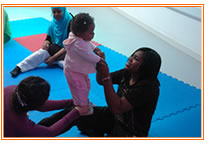 MAE and NHS (Perinatal Parent Infant Mental Health Service) are developing a programme to encourage healthy parent child bonding. The programme is designed for pre-toddlers and caters to a younger age group than MAE's school programme (which caters for children in reception and upwards). MAE and NHS (Perinatal Parent Infant Mental Health Service) are developing a programme to encourage healthy parent child bonding. The programme is designed for pre-toddlers and caters to a younger age group than MAE's school programme (which caters for children in reception and upwards).
The programme is designed to fill the existing lacuna in physical engagement that currently exists between baby massage and school going age (where the physical education curriculum becomes relevant).
The programme is based on a tripod of concepts:
1. Children are on the ground and to engage with them we need to be comfortable sitting and moving in that sphere
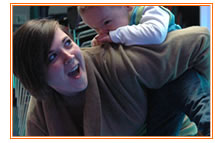 Western culture (for all its other benefits) does not encourage adults to sit or move on the ground. We sit on chairs, wear relatively restrictive clothing and as a culture, have not developed the relevant strength and flexibility that allows us to easily situate ourselves at ground level. Western culture (for all its other benefits) does not encourage adults to sit or move on the ground. We sit on chairs, wear relatively restrictive clothing and as a culture, have not developed the relevant strength and flexibility that allows us to easily situate ourselves at ground level.
Traditional cultures on the other hand are very comfortable on the ground and developed a way of fighting and moving from these positions. The martial arts of Japan, China and Indonesia have retained this traditional knowledge and drawing on systems from these areas we have dev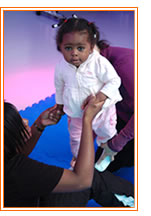 eloped simplified exercises that allows adults, who do not necessarily have an interest in martial arts, to learn a range of postures and movements that facilitate easy movement at a child's level. eloped simplified exercises that allows adults, who do not necessarily have an interest in martial arts, to learn a range of postures and movements that facilitate easy movement at a child's level.
There are multiple additional physical and psychological benefits to this aspect of the programme. These benefits range from core strengthening and physical empowerment to a profound sense of integration and belonging.
2. Using the parents body as a "plaything"
The second leg of the programme includes both a theoretical framework and physical exercises that allow parents to engage in a very physical way with their child. The natural affection between parent and child simply needs a channel, a system of physical inter-engagement through which to manifest.
When working with a one's own child physically and within a healthy frame this natural affection is easily expressed and strongly encourages healthy growth.
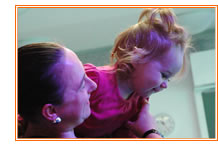 3. Empathetic responses from parents positively impact 3. Empathetic responses from parents positively impact
As children grow and develop, the sensitive parent will subtly and naturally adapt the exercises to both challenge and support their child. This may include the use of child friendly music, verbal explanations and exaggerated facial expressions and eye contact. To achieve this parents need to extend their range of emotional expression through the full human range (including verbal, tonal and physical articulation). This practise encourages a sensitivity and empathy which extends to, and positively impacts all relationships.
The full effect of such focused and positive attention can not be over emphasised in developing a young childs sense of self.
Return to top of page
The programme in the field
Beconstree Children Centre
We delivered this programme at 6 pilot seminars at the Beaconstree centre (Barking & Dagenham) and here are some of the comments from the participants:
 "She [my daughter] is much more receptive to touch and cuddles" "She [my daughter] is much more receptive to touch and cuddles"
 "Much closer. She will approach me and want to climb on me for play." "Much closer. She will approach me and want to climb on me for play."
 "I have learnt the importance of being on the ground level with my child and how I am the most important plaything [for my daughter] of all" "I have learnt the importance of being on the ground level with my child and how I am the most important plaything [for my daughter] of all"
 "I have learnt safe ways to play and engage my daughter on the ground" "I have learnt safe ways to play and engage my daughter on the ground"
 "I have learnt different exercises that will strengthen my daughters torso and my joints" "I have learnt different exercises that will strengthen my daughters torso and my joints"
John and Children Services
Delivering these concepts on an individual basis has had profound consequences:
Child services were threatening to take John's son and daughter out of his care. Once he had satisfied social services that he was able to take care of his children they were not satisfied with his parenting skills and whilst they recognised that he loved his children they were not confident in his ability to communicate and express this.
After 6 sessions where John was introduced to the concepts and exercises John:
 easily satisfied social services of his parenting skills, easily satisfied social services of his parenting skills,
 has inestimably improved his relationship with his children and has inestimably improved his relationship with his children and
 has been so inspired by his experience that is investigating changing his career to work with children. has been so inspired by his experience that is investigating changing his career to work with children.
Return to top of page
Multiagency Training- Maternity to Adulthood 2014
On the basis of the success of the programme in the field and the robust theoretical framework it rests on, MAE has been invited to speak at 6 NHS conferences.
Click here for more information.
Martial arts & Public Health:
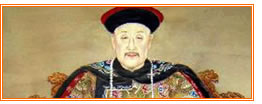 Throughout history the highest level martial artists have always recognised that it is their responsibility to use their art to strengthen and enrich society. For example, Yang Lu Chan the Chinese founder of Yang style Tai Chi (the most popular style of Tai Chi practised today) famously said to his grandson: Throughout history the highest level martial artists have always recognised that it is their responsibility to use their art to strengthen and enrich society. For example, Yang Lu Chan the Chinese founder of Yang style Tai Chi (the most popular style of Tai Chi practised today) famously said to his grandson:
"This art I practise and teach to others is not for taking on enemies but for helping the nation"
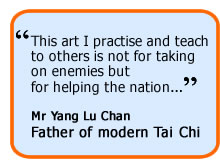 Across space and time, now in Brazil, Rickson Gracie, unbeaten and widely regarded as the most fearsome martial artist of modern times has famously given up competition to focus on his father and teacher's vision of using Ju Jitsu to empower the vulnerable. Click here for more information about the Gracie family. Across space and time, now in Brazil, Rickson Gracie, unbeaten and widely regarded as the most fearsome martial artist of modern times has famously given up competition to focus on his father and teacher's vision of using Ju Jitsu to empower the vulnerable. Click here for more information about the Gracie family.
Psychologically robust, stable individuals who feel connected and safe in the world act ethically; emotionally weak and disturbed people although often determined and even charismatic often climb their way to positions of power and influence making ethically questionable decisions out of a need to control, dominate and disempower others. Culturally it is in our interest to encourage the development of the former, and we can do this through the channels of Education and Public Health.
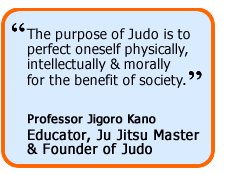 Our sense of belonging and being safe and protected in the world begins in infancy with our relationship with our parents and then when we enter school, our engagement with life extends to a greater community. Our early experiences with that community profoundly influences our sense of belonging. Our sense of belonging and being safe and protected in the world begins in infancy with our relationship with our parents and then when we enter school, our engagement with life extends to a greater community. Our early experiences with that community profoundly influences our sense of belonging.
Recognising how important this early period is we then need powerful and effective methods to ensure that children initially have strong relationships with their parents and then have an intensely positive experience in their early years at school. A positive schooling experience greatly improves learning ability and creates better adjusted citizens who recognise at the deepest level that their interests are aligned with those of their community and their greater society.
Efficacy of MA in this arena:
No other practise we have encountered has the power of martial art, to so catalyse growth across the physical, intellectual, psychological and even spiritual spectrum of human experience. This can be attributed to:
 its intense physicality it offers a profoundly enjoyable and satisfying experience (to quote one student when asked by his mum how he found the class he replied: its intense physicality it offers a profoundly enjoyable and satisfying experience (to quote one student when asked by his mum how he found the class he replied:
"That was the best hour of my life"
 it is truthful and intelligent which means that the truths discovered and practised through it are applicable to other areas of life (click here for more info.) it is truthful and intelligent which means that the truths discovered and practised through it are applicable to other areas of life (click here for more info.)
 martial arts attaches to multiple healthy archetypal needs, young boys for example want to know how to fight and because of martial arts relationship with a chivalric code is an excellent platform to encourage positive values. (click here for more info.) martial arts attaches to multiple healthy archetypal needs, young boys for example want to know how to fight and because of martial arts relationship with a chivalric code is an excellent platform to encourage positive values. (click here for more info.)
Return to top of page
|